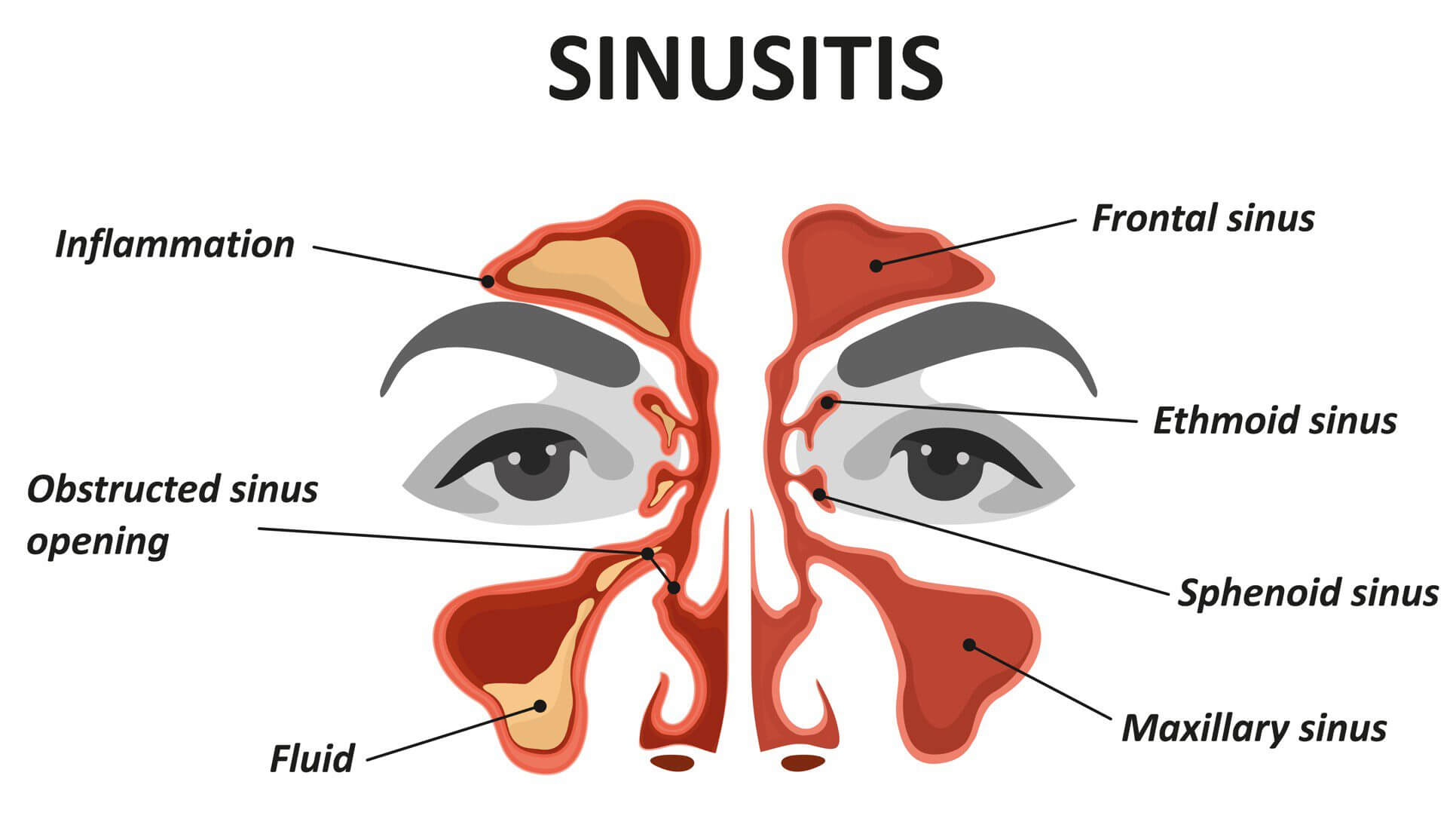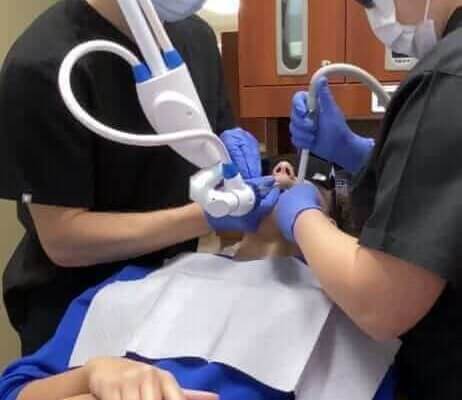Allergies, colds, upper respiratory infections, and the flu can all result in sinus infections. Symptoms of a sinus infection include a stuffy/runny nose, discharge in the throat, cough, sore throat, fever, and feelings of heaviness behind the cheekbones. However, a lesser-known symptom of a sinus infection is a toothache.
If you’re wondering “can a sinus infection cause tooth pain in teeth,” the answer is a resounding yes! However, it is important to understand why sinus infections cause toothaches, how to differentiate between a sinus toothache and a regular toothache, and when to see Dr. Derek Hauser or Dr. Mark Phillipe.

Understanding Sinus Infection Tooth Pain
To understand the connection between infections of the sinus and tooth pain, it is important to know the anatomy of the sinuses.
Sinuses consist of four pairs of air-filled cavities (spaces) located near the eyes, forehead, and cheekbones. The sinus cavities warm, moisten, and filter air in the nose. The sinuses also produce mucus to clean the nasal cavity. When sinuses become blocked or inflamed, the result can be a sinus infection.
The reason why a sinus infection may lead to a toothache is because the maxillary sinuses—the ones located near the cheekbones—are very close to the upper molars and premolars. When a sinus infection fills the maxillary sinuses with fluid instead of air, the sinuses push against the roots of the upper rear teeth. The brain often misinterprets the resulting pain as coming from the teeth rather than the sinuses. This is called “referred pain.”
To make things more confusing, research has revealed that up to 40% of chronic bacterial maxillary sinus infections are caused by dental infections. In these cases, the close proximity of the maxillary sinuses and the rear teeth may result in infectious bacteria traveling from the teeth and gums into the sinuses. When this happens, sinus pressure from tooth pain can result. Treatment requires antibiotics and treatment of the underlying infection in the teeth.
Sinus Toothache or Regular Toothache?
Although a sinus toothache and a regular toothache may share similar symptoms, there are key differences that differentiate the two.
• Sinus tooth pain is usually felt in the upper molars and may affect several teeth instead of one tooth on one side of the mouth. Sinus toothaches also tend to cause pain on both sides of the face. However, sinus tooth pain on one side of your mouth is also possible. By contrast, a regular toothache is usually felt in a specific tooth.
• Sinus toothaches are typically accompanied by other symptoms of a sinus infection, such as a stuffy nose, fever, cough, and sore throat. By contrast, a regular toothache (such as one caused by an abscess) may be accompanied by symptoms such as swelling or redness of the gums, a bad taste in the mouth, dental pain with temperature changes (such as drinking a hot or cold beverage), facial swelling, or pain near a tooth that underwent dental work.
• Pain from a regular toothache tends to be sharp, severe, intense, and focused, whereas a sinus toothache feels more like an ache or pressure on the teeth.
• Sinus toothache pain often increases with certain types of movement, such as jumping up or bending over. A sinus toothache may also diminish when laying down or sitting. With a regular toothache, the pain won’t lessen with movements or body position.
Perhaps the biggest difference is that a sinus toothache will disappear when the sinus infection clears up, whereas a regular toothache will not dissipate until the underlying cause is addressed.
Regular toothaches may be caused by a variety of dental issues, including tooth damage (such as a fractured or decayed tooth), teeth grinding (bruxism), or gum disease. Some of these conditions may cause pain in the upper teeth, which might be confused with a sinus toothache.
In addition, a dental infection may also be the cause of a sinus infection. To definitively rule out a dental reason for your tooth pain or sinus infection, make an appointment with Lakefront Family Dentistry.
When To See A Dentist for Sinus Tooth Pain
Although sinus tooth pain will diminish when the sinus infection clears up, a toothache will not disappear until the underlying cause is addressed. To be on the safe side, visit Dr. Hauser or Dr. Phillipe whenever you experience tooth pain. This allows the doctors to rule out a dental issue or disease as the root cause. After all, if the pain is unrelated to a sinus infection, it must be addressed before you’ll experience any relief.
After a thorough exam, Dr. Phillipe or Dr. Hauser will be able to diagnose the cause of the tooth pain. If the cause is sinusitis, the doctors may be able to prescribe medication and will refer you to your primary care doctor for further treatment. If the cause is a dental issue—such as a cavity, abscess, or periodontal disease—treatment can begin immediately.
The primary goal is to return the patient to a pain-free life as quickly as possible. “No one wants prolonged tooth pain,” says Dr. Phillipe. “We want our patients to get relief as quickly as possible. We also like to remind patients that the best method for preventing toothaches is to practice good oral health, which includes regular dental check-ups, brushing twice a day, and flossing daily.”
Give us a call to schedule an appointment at (951) 244-9495 if you meet the criteria above for sinus tooth pain or schedule one through our website anytime.






